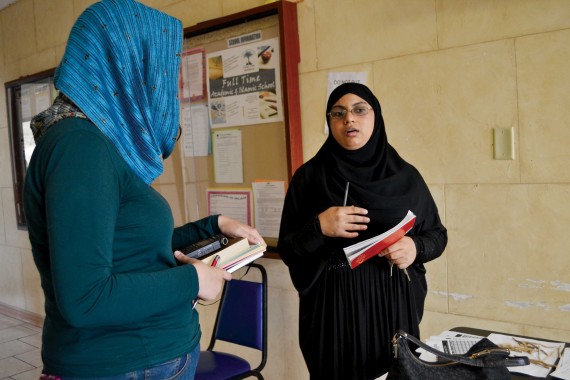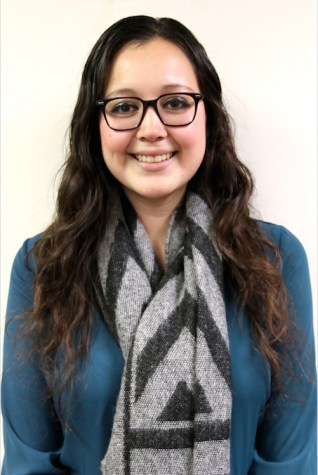“Allahu Akbar” echoes off the stucco walls as a congregation of men bow before the imam reciting prayers to Allah. A separate room in the back of the mosque is used by a group of women dressed with multi-colored hijabs and chadors.
As of 2010, there were 2,968 Arabs in the El Paso County, according to usa.com, representing 0.46 percent of the population at the time. This number has increased.
Uzma Yaqoob, member of the Islamic Center of El Paso and part of their women’s committee, has seen an increase in Arabs visiting the mosque during her time as a member there.
“Most of the attendants that come to the mosque are students or resident doctors, more than 50 percent. They come here for the first time to settle,” Yaqoob said. “We also have new Muslims that attend, which are those who were not born Muslim, but have converted. They make up the other half of our population.”
In Islam, segregation is seen as a part of daily life. The mosque has two separate entrances for men and women, along with separate rooms for men, women and children for prayers. Free-mixing between the opposite sexes is not allowed unless they are direct family.
“Fridays are when everyone gathers for the congregational prayer. It’s obligatory for men to come since they can only miss so much. Women are not required, but they are recommended to come if they can,” Yaqoob said. “It is a way for the community to get to know each other and help everyone out with spiritual and practical guidance. We have around 200 members.”
Being an Arab-Muslim or Muslim in El Paso can be a stark contrast from the home countries that these individuals come from. For Yaqoob, culture can create conflict since each person is brought up differently as a Muslim and beliefs may oppose one another.
“I am from Pakistan and I know how to read Arabic, like the Qur’an, but not fluently. I was brought up to learn how to read it, even as a non-Arab. The understanding and knowing how to speak conversational Arabic is not something that I have learned, but I am working on it,” Yaqoob said. “You do get a bit of stigma attached though. I’ve been here four to five years and I haven’t encountered anything bad. Of course you get the occasional person staring, but that is the usual and something you have to deal with.”
Yaqoob recounts a moment when she visited the border and was approached by an older man who had mistaken her for a nun.
“It is something that I have grown up with, especially when I grew up in the UK. In El Paso, I mainly struggle with Spanish because I don’t speak it,” Yaqoob said. “Sometimes you do get the occasional negative comment, but other times people will come up to me and comment on how nice my head scarf looks and that is really encouraging.”
Maissa Khatib, director of the Arabic program and lecturer for the languages and linguistics department, has been a resident of El Paso for more than 20 years after she emigrated from Palestine.
“I was born as an Arab-Muslim. Being in El Paso, I have never felt like an outsider. I have only had two experiences that were negative, one from a physician and one from a UTEP professor,” Khatib said. “When I was with this physician, he put me on the spot by asking if my husband had three wives or saying how I could not eat pork because it was so tasty. It was uncomfortable and humiliating for me to experience that. It was a discriminating experience.”
With the Arabic program at UTEP, students are given the opportunity to learn Arabic in a non-traditional way.
“We immerse the students in the culture by letting them explore the mosques we have in the city or attending Arabic events. Arabic resources are limited in El Paso so we plan an Arab film festival that we have every year and we participate in the international food fair,” Khatib said. “We want to get students exposed and get them networking in the community.”
Abderrahman Khamsi, senior nursing major, moved to El Paso in 2007 from Casablanca, Morocco, with his family after his father got a job at UTEP to do research in chemistry.
“My family and I are practicing Muslims. We’re just born and raised that way. I guess when you’re being raised from a young age, you get accustomed to it and don’t bother researching other alternatives,” Khamsi said. “I’m happy where I am.”
Khamsi prays at the mosque with his family, attending the weekly congregation on Fridays.
“There are some Muslim friends that I have here and there, but honestly, my closest friends are non-Muslim. I feel more comfortable around them,” Khamsi said. “When you have Muslim friends, you have to constantly be watching what you are doing or say so you don’t offend anybody. I see myself as open-minded, but that is something that most Muslims aren’t—it’s either right or wrong.”
For Khamsi, he sees a difference between the Hispanic and Arabic culture in El Paso, along with similarities.
“The most prominent similarity is the machismo role in a family and society for men. I can tell growing up I’ve always seen my father as this powerful, almost frightening, figure. We didn’t argue; there was no need because he was right,” Khamsi said. “Coming here and interacting with my cousins and seeing them communicate with their Moroccan father, I was offended. I felt sorry for my uncle in how they treated him, but I appreciate now the level of openness in their household.”
Yaqoob believes that in order to merge the cultures together, it is important to educate the community about Islam.
“In El Paso, 82 percent of the population is predominantly Catholic. So for someone in the community to convert to Islam is a big deal because it is a completely different system,” she said. “It is nice here, but sometimes it is difficult because El Pasoans aren’t as aware about the culture or the religion like in Houston, where I visited a couple of times.”
Although his culture differs from El Paso, Khamsi firmly believes
in his religion and stands by his Arab-Muslim heritage.
“I was raised in an environment where faith is an essence of our identity—losing that is an indication of losing yourself,” Khamsi said. “I think that my family is a strong support for keeping that desired level of faith.”
Lorain Watters may be reached at [email protected].







